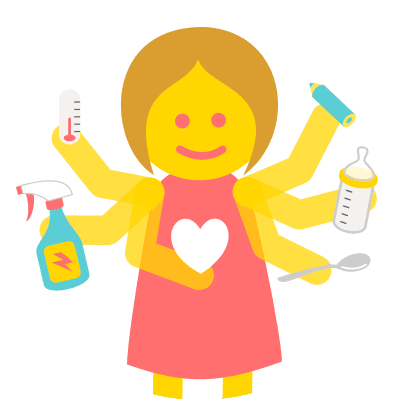First-Time Babysitting (20 Things You Should Know + Video)


Written & Illustrated by
Matthew James Taylor
Kidsit Founder, General Manager

Babysitting video by
Lydia Kutz
Babysitter, Infant Swimming Resources Instructor
Key Takeaways
- Parents value reliability, honesty, and trust above all - being on time and following through is essential.
- Know your worth: research local rates and expect fair pay for your time and skills.
- Understand the difference between babysitting and nanny work - nannying involves more responsibility and often employment benefits.
- Be ready to help with all basic tasks, including diaper changes, potty help, bathtime, and sticking to house rules.
- Get prepared with safety training (First Aid, CPR), gather emergency contacts, and study infant care if you’ll be caring for very young children.
- Kids follow routines - meals, naps, bedtimes - so consistency helps everything run more smoothly.
- Be flexible: expect surprises, schedule changes, or tasks you didn’t anticipate. Adaptability will serve you well.
Babysitting for the first time can be nerve-wracking. But with a bit of preparation and knowledge, you can start your babysitting career with confidence.
Here are the top things first-time babysitters should know:
- The most important thing to a parent is that you are reliable, honest, and trustworthy
- Charge what you're worth
- You are able to say No to jobs and fire clients
- Nannying and babysitting is very different
- Younger kids will need help in the bathroom
- Learn the house rules – and stick to them
- Study infant care before babysitting an infant
- Gather contact info
- Get safety training
- Understand the tasks that are expected of you
- Stick to routines
- Know how to handle common kid behavior
- Be flexible
- You will face unexpected situations
In this article, I'll give you all the details on these first-time babysitting tips plus more. That way there shouldn't be many surprises the first time that you're left alone to babysit a child.
Lydia has been working in the childcare industry for 15 years, and owned a childcare agency in Florida, USA for 7 years. In this video she shares the things she wished she knew before her first time babysitting.
First-Time Babysitting Tips
There are some things that every babysitter needs to learn as they start to work for the first time. Not all of them are obvious or intuitive. Parents spend so much time with their kids that they can take a lot of the knowledge they've picked up for granted. So they might not explain some things to you that you really need to know when you start babysitting.
Here is some babysitting-related knowledge that you should know, but that probably never crossed your mind.
1. The most important thing to a parent is that you are reliable, honest, and trustworthy
The fact that you are reliable, honest, and trustworthy is huge to a family. If you are trustworthy and you are honest about what's going on and they can rely on you to be there when you say you're going to be there and you're going to be consistent throughout their kids young lives, that's what's truely important to a family.

Babysitter, Infant Swimming Resources Instructor
St Petersburg, Florida, United States
2. You are able to say No to jobs and fire clients
If you are uncomfortable working for a family or if you don't feel you are being respected then it is okay to stop working for them. It can be a hard thing to do, to say No, but you will thank yourself later. There's always more work with other families. See my guide for saying 'no' to families here: How to Say No to a Babysitting Family (5 Reasons Plus Tips).
3. Charge what you are worth
I first started babysitting for neighbors and I was a mothers helper and I did not do any research about what babysitters made, or what mothers helpers made, so I just accepted whatever they offered, and it was a low amount. I wish I had of looked at what other babysitters were making in the area, what other babysitters were doing, and what certifications I had at the time to charge a little bit more.

Babysitter, Infant Swimming Resources Instructor
St Petersburg, Florida, United States
Average Babysitting Rate Per Hour By Country
(Calculated weekly from our live member data — Updated 16 Feb 2026)
| Country | 1 Kid | 2 Kids | 3+ Kids |
|---|---|---|---|
| United States | $16.82 | $18.50 | $20.18 |
| Canada | $18.33 | $20.16 | $22 |
| United Kingdom | £11.38 | £12.52 | £13.66 |
| Australia | $26.83 | $29.51 | $32.20 |
| New Zealand | $22.74 | $25.01 | $27.29 |
Search for your exact location to get a more precise average pay.
4. Nannying and babysitting is very different
Just because you can babysit doesn't mean you can nanny, they are very different jobs. The job requirements for a nanny is a lot more involved, it's not just extra hours, you also become an employee of the family rather than being self-employed as a babysitter.
See our parent article: Babysitter vs Nanny: Cost & Duties (Which Is Best For Your Family?) to see what all the differences are.
5. Younger Kids Will Need Help In The Bathroom
For infants, it's obvious that you'll need to change their diapers when they go to the bathroom. But what age do kids no longer need help anymore?
It might be later than you think. Just because a child is usually potty trained between two and three years old, that doesn't mean they can do everything in the bathroom themselves.
Most kids don't develop the motor skills needed to wipe their own bums until they're at least four or five years old. In some cases, even later. This might really catch you off-guard the first time you're babysitting if you're not ready for it.
Generally, it's good to ask parents if you'll need to accompany their child to the bathroom if they're under six.
6. Learn The House Rules – And Stick To Them
Every family that you babysit for will want things done a little bit differently.
Some kids will be allowed to eat sweets, others won't.
Some activities like watching television may be off-limits, or they might only be able to watch a set amount per night.
Kids in different families will have different bedtimes, even if they're the same age as another child that you babysit.
It's good to make yourself a list of all rules specific to the family that you're babysitting for and keep it in your babysitting binder so you can refer back to it when you need to.
Try to cover most of the common rules with parents before they leave for the evening. Otherwise, they might not take the time to let you know what's off-limits and what's allowed. If you don't ask, you'll either need to use your judgment (and potentially be wrong) or contact them while they're out.
7. Study Up On Infant Care If You'll Be Babysitting An Infant
Babies require more attention and specialized care than other kids that you might babysit.
Before you watch an infant, you should know the basics like how to change a diaper, how to prepare formula, how to burp a baby, what to do when they cry, and other infant-specific details. There is also specific safety rules that apply when watching infants, but not to older kids.
I would recommend getting some hands-on experience with an infant before trying to babysit one alone for the first time.
For specific details on caring for an infant, check out my article How to Babysit a Baby: The Beginner’s Guide.
8. Gather Contact Info
Try to phone numbers and contact details for people you may need to reach. At a bare minimum, you should have the cell phone number of at least one parent that you're babysitting for. Ideally their partner's phone number as well.
It could also be a good idea to get the number for the restaurant they're going to, and contact details for a nearby friend, family member, or trusted neighbor. Plus emergency contacts for their pediatrician, poison control, and the location of the nearest hospital.
You might never need to use most of these numbers. But it’s better to have them ready and never need them, then to scramble to find them in a crisis.
Also, know when it's appropriate to call 911. Like if a child is having trouble breathing, choking, or unconscious. As silly as it sounds, it's a good idea to write down 911 on your emergency contact list. In the heat of the moment, you might get so panicked that you forget about it otherwise.
Print out my parent details form and use it to record all the important contact details for the family. I also recommend you print the babysitting emergency numbers for your country and have them with you at all times too.
9. Get Safety Training
Before your first time babysitting, I'd recommend taking a basic First Aid and CPR class.
If you babysit for long enough, accidents are bound to happen. And when you're babysitting for the first time, they're even more likely since you're inexperienced.
You'll want to be able to deal with minor scrapes and cuts, as well as problems that are more serious. First Aid training will give you the knowledge you need to handle some serious medical situations that could potentially come up like choking, broken bones, and more.
See my recommended babysitting courses.
With the proper training in advance, you're less likely to just freeze and not know what to do if a child you're babysitting gets injured. Your training will hopefully allow you to go into autopilot and deal with the situation.
Can you babysit without having taken First Aid or CPR? See my article Can You Babysit Without Qualifications? to find out!
10. Different Aged Kids Will Want Different Things
A play activity or craft that might seem really cool for a toddler may seem really lame to an eight-year-old. What kinds of toys and games kids will like, and even how you interact with them, will be largely dependant on their age.
Break kids down into at least the categories of infants, toddlers, preschoolers, and school-aged children. Realize that each group will have different needs and ways of communicating.
Older kids are more developed and capable of performing more complicated tasks, and they will probably appreciate more of a challenge. But younger kids might become frustrated or overwhelmed if you present them with an activity that's beyond what they're capable of.
Different aged kids are more at risk for unique types of dangers in the house too. Younger kids are more at risk of choking on small objects, for example.
A good babysitting course should explain the different age groups to you, and the unique needs of each.
Need new babysitting ideas? Check out my huge list of over 200 babysitting activities and filter them by child ages to find exactly what you need.
11. Understand The Tasks That Are Expected of You
If you've never babysat before, you might not know what parents expect of you. Besides the basics of making sure their child is still safe and unharmed when they get home.
But babysitting is more than just supervising and monitoring kids to prevent them from getting hurt. You might also need to prepare snacks or meals for them, play with them, help them wash their hands, give them a bath, put them to bed, and more.
You might want to talk to an older babysitter and have them explain what an average night of babysitting looks like for them. That way you'll have a general idea of what kinds of tasks and activities you'll need to do.
12. Be Respectful
Parents that you babysit are paying you for your time, and they're also taking a bit of a risk by allowing a stranger into their home to look after their kids.
Show respect in all of your babysitting interactions. That means when speaking with parents as well as their kids. But also little things, like not eating food out of their fridge without asking permission.
Be respectful of the privacy of families that you babysit for too. Don't go into any rooms that they say are off-limits, and don't go looking through their drawers or medicine cabinet.
Families of different cultures may have different ideas of what they consider respectful or disrespectful behavior. Even little things like taking your shoes off at the door will help make a good impression on parents. And if they like you, they'll be more likely to hire you again or recommend you to friends.
13. Naps Are Important
The younger a child is, the more sleep they'll need. Often they need to take naps throughout the day.
Skipping naps is a recipe for tantrums and generally miserable kids. So if parents give you specific times that their kid needs to lay down for a nap, be sure to stick to it.
Try to pick activities around nap time that make sense too. You don't want to over-stimulate kids with something really exciting and get their blood pumping right before you want them to lay down and sleep. So try to ease them into more laid-back and relaxing activities as you approach nap time.
For infants, make sure to lay them on their back and that there aren't any small objects in their crib that they could choke on.
14. Stick To Routines
Making kids take naps is important, but it's likely just one part of their routine.
Kids tend to do best when they have lots of structure in their lives. They're used to doing specific things at specific times. So try to stick to their regular schedule so they know what to expect. It's already different enough that they have a babysitter instead of their parents to look after them.
Kids probably have scheduled times to sleep, times to play, times to eat, a time to take a bath, and more. Work with parents to learn exactly what the routine is that you should be sticking to.
15. Be Aware of Pets
Different pets will react in their own unique ways to a new person being in the house. Some cats and dogs may be scared of new babysitters and try to stay in other rooms away from you. Others might want to be your best friend and get all of your attention.
If you're carrying an infant, be especially mindful of where pets are. Otherwise, you could find yourself getting tripped up if they walk in front of you, particularly on stairs.
Some pets may also get jealous of someone new giving lots of attention to a child in their house. In the worst cases, they may even snap at kids you're babysitting. So be mindful of that.
Every pet is unique and has its own personality, just like different kids that you babysit. So you might need to use different strategies to get different dogs or cats to warm up to you as a babysitter.
16. Avoid Babysitting When You're Sick
If you've got a cold or flu, it's probably best to let parents know that you won't be able to babysit for them. While it can be disappointing to have to cancel their plans or find another babysitter, they'll understand. It's better than the alternative, which is having their child get sick and having to take time off work, take them to the doctor's office, and make other arrangements.
The younger a child is, the more vulnerable their immune systems are. So it's particularly important not to babysit newborns and infants when you could potentially get them sick. They can get quite sick even from a common cold.
Even if you're just starting to get symptoms, you still be contagious. So keep track of how you're feeling to decide if you should be around kids or not.
If you're babysitting, it's not a bad idea to get the flu shot every year, to help minimize the risk of getting sick and not being able to work.
See my Should you Babysit when Sick? (How to Manage Parent Expectations) to learn more about how sick is too sick to babysit.
17. Know How To Handle Common Kid Behavior
What will you do if a child doesn't want to take a bath or go to bed, and decides to throw a tantrum?
How will you deal with separation anxiety if a child won't stop crying after their parent leaves for the evening?
Even little things like getting a child to put their jacket on before they go outside can be a struggle sometimes.
As a new babysitter, these are the kinds of situations you'll need to prepare yourself for. You need to know how to prevent as many of these situations from arising as you can, and then also know how to deal with difficult behavior that might happen anyway. There are different strategies that you'll need to employ for each of these situations, plus many more to consider as well.
Kids will always push limits and try to test you. It's part of the development that they go through as they grow up. As a babysitter, you'll need to be able to enforce any limits or rules that are in place.
Having trouble with an emotional child? See my guide to calming an upset child for some handy tricks.
18. Be Flexible
Things might not always go as you expect while babysitting. You might have plans for the day to go one way, but things might turn out entirely differently. Be prepared to go with the flow. As long as you're keeping the kids you're babysitting happy and healthy, that's all that matters.
Also, be prepared for parents to run a bit late from time to time. You may need to babysit an extra hour longer than you intended.
19. Know What Foods Kids Can and Can't Eat
Ask parents about any allergies that their kids have before they leave. You don't want to cause an allergic reaction by mistake when you give them a snack.
Younger kids will have more restrictions on what they're able to eat and will need food cut into small pieces so they can't choke.
Some kids might also be picky about little things like if they want their sandwiches cut into triangles or rectangles too. Ask parents about any little quirks their kids might have about food, especially if they're picky eaters.
How are your skills in the kitchen? Read my article Do Babysitters Provide Food? (What Parents May Expect From You) to see if you're up to par.
20. You Will Face Unexpected Situations
You can never be fully prepared for your first time babysitting. Even after taking a babysitting course and reading all that you can about babysitting, things are going to come up that you aren't ready for.
Part of what separates a good babysitter from a great one is how they can deal with new situations and rise to the occasion. Be prepared to think outside the box and find unique solutions to problems that might arise while you're babysitting.
The more that you learn and prepare in advance, the larger of a knowledge base you'll have to draw from when something unexpected comes up. A good babysitter is able to stay cool under pressure and find solutions.
Conclusion
When you're just starting off as a babysitter, you can be totally unaware of all of the things that you don't know yet. Some of them you can learn about and prepare for, and some will just come with experience.
Hopefully after reading this article, now you have a few extra things to keep in mind for the first time that you babysit.
You can never be completely ready to get started. But taking a babysitting course and reading through some of my articles will hopefully put you well on your way to being a great babysitter.
Next:

























